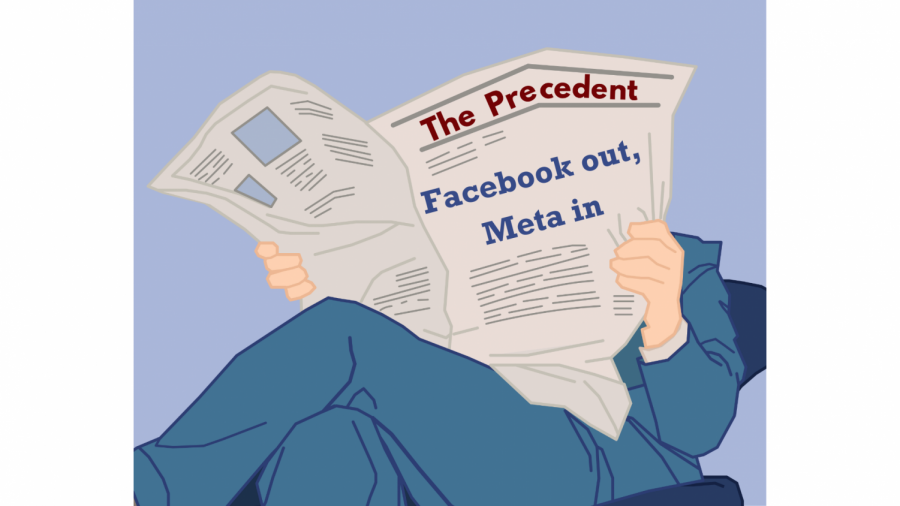Facebook out, Meta in
Facebook Inc. transitions to Meta Platform Inc
Facebook Inc. rebrands to Meta Platforms Inc. in an effort to create the “Metaverse.” The social media platform is still referred to as Facebook, but the company is now called Meta.
Social media. Everyone knows it’s just for teenagers; it conjures ideas of pretty pictures, memes, selfies, and funny videos, right? Well, not exactly. Over time social media has evolved and become multi-purposeful. There are numerous social media accounts dedicated to raising awareness for several different political movements. Some accounts have powerpoint-style slides explaining and simplifying the social issues they deem important. In the 2020 race, many candidates paid for ads on social media platforms. Social media has changed a great deal since its initial launch of a photo sharing platform.
Ever since early October, Facebook Inc. has been a hot topic in the news circuit when Frances Haugen, a Facebook data scientist, came forward to accuse Facebook of prioritizing profit over the safety of their users. She presented thousands of pages of the company’s research to support her claims that the Facebook platform harms children and spreads misinformation. These documents were dubbed the “Facebook Papers.” In addition to Haugen’s claims, many people blame Facebook for the rampant spread of misinformation about COVID-19 and the 2020 Presidential Election after Facebook did not take action against incorrect statements. It is possible this happened because many incorrect claims increased engagement on the Facebook platform.
Facebook has gradually been losing young users. In a recent survey of 218 Perry students, 24.9% (54 students) claimed that they do have a Facebook account. Only eight of the 54 students said they used Facebook on a regular basis. In total, 98.5% (201 students) admitted they preferred Instagram (which is owned by Facebook) to Facebook. The younger generation views Facebook as a social media platform for their parents, and because of that, the average age of Facebook users is rising.
In part of Facebook’s efforts to increase users, they have pushed for growth outside of their traditional user base in the U.S. and Western Europe. But Facebook was not prepared for the dramatic increase of new users and failed to provide sufficient staff and systems to limit the spread of misinformation and hate speech. The uncontrolled spread has been directly linked to violence against minorities in other countries.
Haugen’s (and a number of other Facebook workers) problem is that there has not been any internal effort to stop the spread of misinformation because it increases profit and growth. Facebook has grown increasingly defensive of their position, saying that the documents that Haugen presents are just a few out of millions, and that their whole mission is to “keep people safe on Facebook” (excerpt from prepared statement from Facebook on Oct. 22).
Since Haugen has come before Congress, there has been a rare unity between the bipartisan parties in an effort to “protect the children.” Lawmakers are introducing a host of new laws to bridle “Big Tech”, which includes, but is not limited to Facebook.
Other countries are also taking action, including the U.K. Parliament, who turned to Haugen for counsel on how to navigate the newly proposed safety regulations. Such sentiments are also seen in Australia and all through Europe.
In a rebranding effort, Facebook Inc. has been renamed to Meta Platforms Inc. However, the social media platform will still be called Facebook. They are also looking to hire 10,000 new workers over the following five years. Mark Zuckerberg hopes to create a “metaverse” where anything is possible. Critics fear that this great expansion will be similar to other expansions that Facebook has attempted in the past: uncontrolled and harmful to many minority groups.
More information surrounding Facebook can be found at AP News, in their media compilation titled “The Facebook Papers.”

Saydria Ostler is a senior at Perry High School, and this is her third year of newspaper. Saydria is the Editor-in-Chief this year! When Saydria is not...

Logan Cogley is a freshman at Perry High School and is in his first year of being apart of The Precedent. He is very excited to cover Girls and Boys Volleyball,...








Dr. Valerie Dopp • Nov 15, 2021 at 10:36 AM
Great article, Saydria! Very informative. Kudos! Dr. D